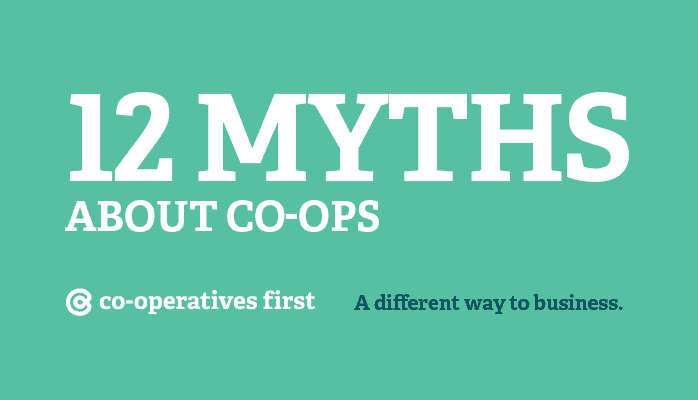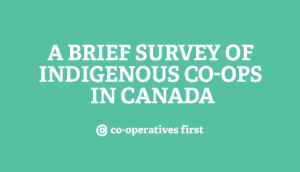Co-operatives have existed, in one form or another, for centuries. Found across industries, and in big and small places all around the world, co-ops are everywhere. The versatility of the model is impressive and effective. But we’ve encountered a few common co-op myths that limit innovation with the business model in western Canada.
Here are 12 myths about co-ops we frequently hear. See if you recognize any.
‘I participated in a co-op in university and got to work for a great company’
Oh yes! The infamous not-even-a-co-op-co-op. These “co-ops” are actually a partnership between a university and business to provide work placements. Universities use these “co-op” programs to attract students and provide practical experience in particular fields of study, like an internship. While these programs are great, and they provide students with valuable instruction and experience, they do create some confusion with the co-op sector.
Co-op work programs are not co-ops and should not be confused with the co-op business model.
‘All members of a co-op are equal’
Sometimes. This one is a little complicated. Co-operatives are based on a form of decision-making that ensures every shareholder gets a say. But not all shareholders are members, and not all shareholders are necessarily “equal.”
Many multi-stakeholder co-ops are built on share classes that reflect a management hierarchy, which is designed to ensure decisions are made efficiently rather than strictly democratically. For example, the share classes for stock photo platform co-op, Stocksy, include photographer, management executive and employee classes. The three tiers of shares can impact the weight of each shareholder’s voice in decision making.
‘Co-ops are great, they give their members dividends’
Not necessarily. Most people are familiar with co-operatively-owned gas stations, grocery stores or financial institutions (credit unions). These co-operatives usually operate as for-profit businesses and issue dividends to shareholders proportionate to their use of the co-op. Consumer co-operatives like these are well-known and prevalent in western Canada; however, the co-op model is much more versatile than simply a retail outlet or financial institution. Organizations that incorporate as a non-profit co-op, for example, will not issue dividends, and a “community-owned” co-op may invest profits into overall community well-being rather than issue dividends.
‘Co-ops are used to meet the needs of a community’
Heck, no. One of the most prevalent myths about co-ops is that they exist to solve needs. Governments might create programs to meet needs. But, like any business or organization, co-ops form to take advantage of an opportunity; and, if the co-operative is to be successful, that opportunity should fill a desire. These desires can come in a wide variety of forms, but might include feeding hungry kids, increasing a community’s housing inventory, creating jobs, business succession, turning a profit or creating competition.
‘Co-ops are great, but they require a lot of volunteers’
Nope. This myth is connected to others on this list, and many of these myths stem from a narrow view of what a co-op can be. While some co-ops, like some non-profit corporations, have volunteers, a great many don’t or compensate for time and effort in some way. In fact, most co-operatives employ staff to carry out the business of the co-op and compensate their directors for serving on the board. Some smaller co-ops offer products or discounts for time put into operations.
‘Co-ops…you mean the gas stations?’
Yes! But, no. The Co-op brand is just about everywhere in western Canada, and many western Canadians equate co-ops or the co-operative business model with the Co-operative Retailing System’s brand. Co-op is a co-op, but not all co-ops are co-op. Got it?
‘Co-ops are for farmers’
Heck, yes! The history of agricultural co-operatives in western Canada is incredible, and the efforts of independently-minded farmers has led to some of the most impressive advances in infrastructure and the largest businesses in western Canada. In fact, the Government of Canada’s Co-operative Secretariat used to be housed within the department of Agriculture and Agri-foods.
But co-ops are not just for farmers. Farmers understand the versatility of the co-op model and have used it to their advantage for many years. But anyone with the desire to take advantage of an opportunity and interest in getting it done can create a business.
‘We should set up our business as a co-op, they don’t pay taxes’
They wish! There’s two things inevitable in life and a co-op won’t be able to help you escape either of them. A co-op is a business and pays corporate tax. Some co-operatives may have a slight advantage if they distribute dividends to shareholders before paying corporate tax, which helps the business avoid double taxation – although the shareholder will still pay (a generally much higher) tax on the dividend.
‘Co-ops… they’re anti-capitalist, right?
Ummm. This misconception seems to be a decidedly western Canadian thing. In much of the US, there is a very different view. And, while there are political parties and factions that claim co-ops as their own, co-ops by and large are wholesale capitalist ventures that don’t bother much with politics. But, for sure, the business model is versatile and can serve both progressive and conservative agendas alike. In the end, the model works well regardless of one’s political allegiance.
‘A co-op? That would never work here’
Why the heck not?! Innovation can happen anywhere. It just takes some creativity, vested interest and a bit of hard work to realize a successful new business – no matter where you are. Plus, historically co-ops have a habit of working where not much else has and growing where others thought it impossible. Still dubious? Check out our Co-op Creator for some more information on what a co-op would look like in your community.
‘Co-ops are government.’
No. No, they aren’t. Both have governance in common, but that’s generally where the commonality ends. If co-ops are government, then NGOs, corporations and a variety of other organizations with a governance model at their core should also be considered government.
In fact, co-ops are often an alternative to government support, and, as a business, increase local market capacity so that outside investment into a small market is more palatable for governments and large, investor-driven corporations.
‘Co-operatives are just community-owned businesses’
Sure. Define “community.” Some co-ops are a community of farmers. Some a community of artists. Others a community of grocery shoppers or vehicle owners. Some a community of grain processors or yoghurt makers. There is also that decidedly murky global community of accountants with letters as a brand. A community of hardware store owners. And, of course, one of the best-known co-ops in western Canada is a community of businesses that owns an oil refinery and massive logistics operation that likes co-ops so much they took Co-op as their name.
Those were our 12 myths about co-ops, did any surprise you?

 Written by
Written by 





